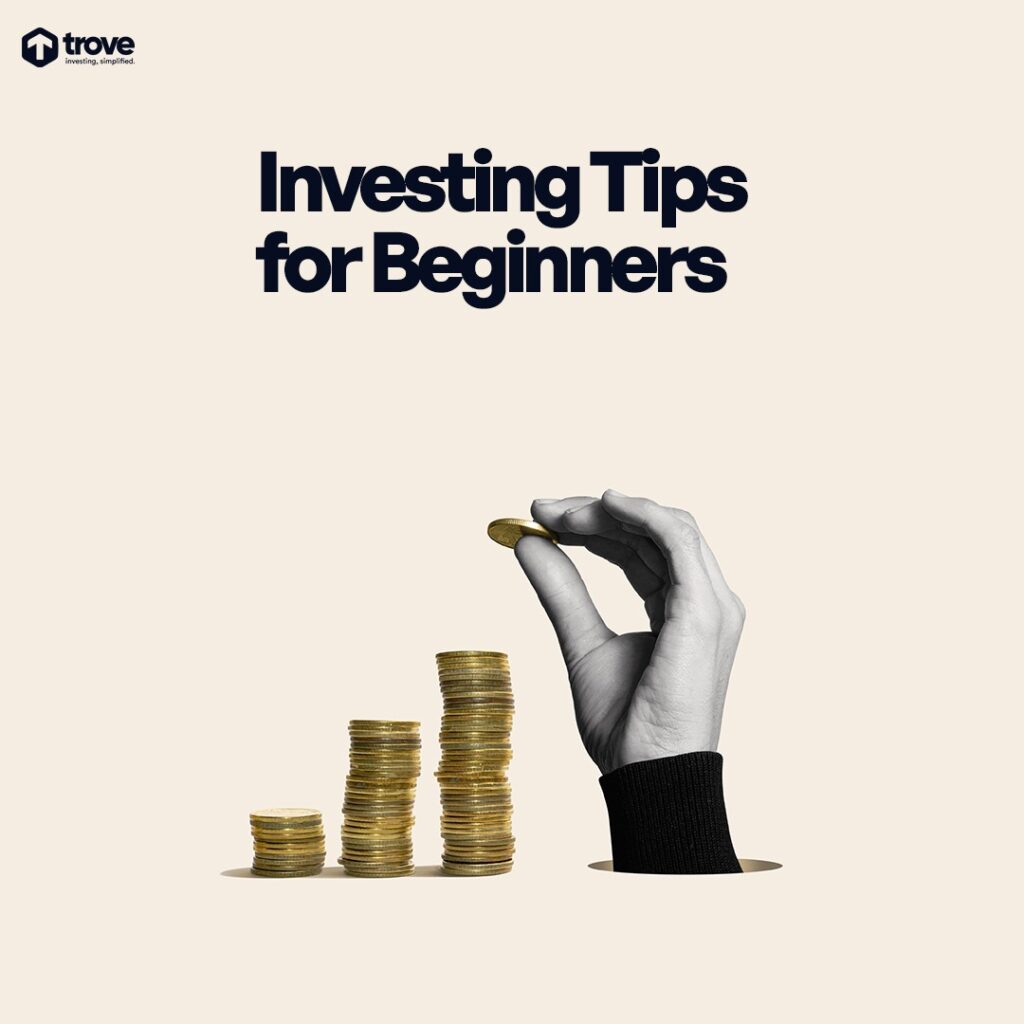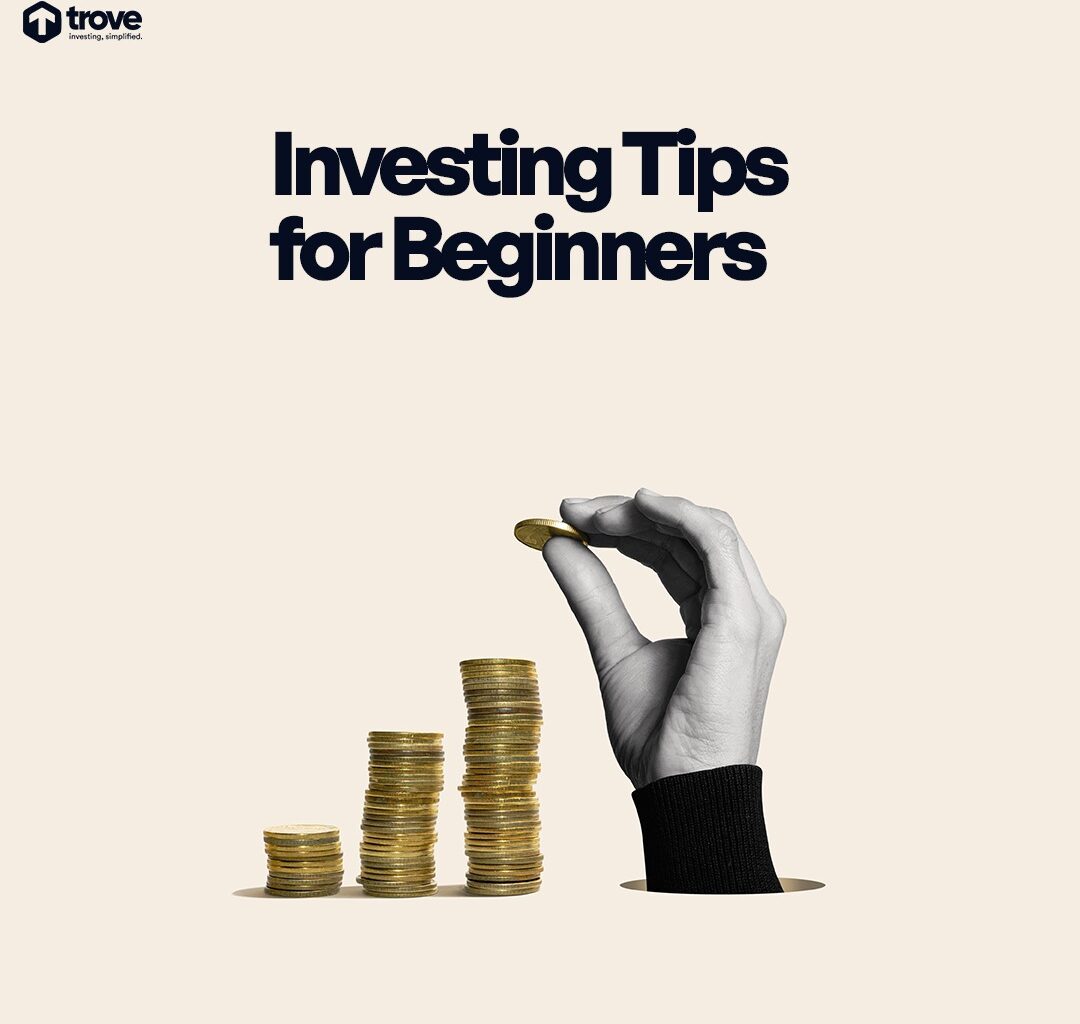I know you’re eager to start investing, but fear and uncertainty are holding you back. It’s completely natural to feel tense or scared when venturing into any type of investment, especially when it involves investing your hard-earned money. I fully understand the sentiment – the fear of losing your savings, the confusion surrounding complex financial terminology, and the stock market drama can make it look so difficult.
But here’s the truth: fear shouldn’t stand in the way of you growing your wealth and securing your financial future. Investing in stocks is not as complicated as you think.
With the right guidance and platforms like Trove Finance, you can start investing confidently, even without being a financial expert. In this post, I’ll share some easy-to-follow investing tips tailored for beginners.

What is Investing?
Investing is the act of allocating money with the expectation of generating income or profit. Unlike saving, which involves setting aside money in a safe place like a bank account, investing has to do with putting your money to work in various financial instruments such as stocks, bonds, mutual funds, and real estate.
The goal is to grow your wealth over time, outpacing inflation and increasing your purchasing power.
Common Investment Terms
Before you start investing, it’s essential to understand some basic investing terms:
- Stocks: Shares of ownership in a company. When you buy a stock, you become a partial owner of that company.
- Bonds: Loans you give to companies or governments that pay you interest over time.
- Mutual Funds: Pooled funds from multiple investors used to buy a diversified portfolio of stocks, bonds, or other securities.
- ETFs (Exchange-Traded Funds): Similar to mutual funds but traded on stock exchanges like individual stocks.
- Dividends: Portions of a company’s earnings distributed to shareholders, usually in cash or additional shares.
How to Start Investing as a Beginner
1. Setting Your Financial Goals
Before investing as a beginner, you need to start by setting clear financial goals. This is crucial because it will guide your investment decisions and keep you focused.
Consider what you want to achieve with your investments. – Do you want to buy a house, plan for retirement, or build an education fund for your children? These goals can be short-term or long-term.
2. Create a Plan
After you have determined what your financial goals are, you need to create a plan. You can create a budget to track your income and expenses. Make sure you have an emergency fund – typically three to six months’ worth of living expenses.
This safety net ensures that you don’t have to sell investments at a loss during unexpected financial setbacks.
3. Understanding Your Risk Tolerance
Your risk tolerance depends on factors like your age, income, and financial goals. Assessing your risk tolerance helps you choose investments that align with your comfort level.
You must also understand that stocks generally offer higher potential returns but come with higher risk, while bonds are more stable but offer lower returns. By balancing high-risk and low-risk investments, you can achieve a blend that suits your financial goals and risk tolerance.
4. Register with an Investing Platform
There are various micro-investing apps you can register with. An example is the Trove app, which allows you to invest small amounts of money – a minimum of 1000 naira for Nigerian stocks and 10 dollar for foreign stocks.
Additionally, index funds and ETFs are great options for beginners because they offer diversification at a low cost.
5. Create a Diversified Portfolio
Diversification is the practice of spreading your investments across various asset classes to reduce risk. A diversified investment portfolio is a mix of different classes of stocks, bonds, and ETFs. For example, you could invest in different individual stocks, bonds, and a real estate investment trust (REIT). This way, if one investment performs poorly, the others can help cushion the blow.
By not putting all your eggs in one basket, you minimize the impact of a poor-performing investment on your overall portfolio.

FAQs
How Much Money do I Need to Start Investing?
You can start with as little as 1000 naira or 10 dollar using micro-investing apps. The key is to start small and gradually increase your investments.
What’s the Best Investment for Beginners?
Index funds and ETFs are great for beginners because they offer diversification and have lower fees.
How Often Should I Review my Investment Portfolio?
You can review your portfolio at least once a year or whenever there’s a significant change in your financial situation.

Read Also: How to Set Up an Investment Plan
Conclusion
Investing might seem daunting at first, but by taking it one step at a time, you can build a secure financial future. Start by understanding the basics, setting clear goals, and making small, diversified investments. As you grow more comfortable, you’ll be able to take on more complex strategies and investments.
Remember, the most important thing is to start – no matter how small your initial investment. With patience, consistency, and a willingness to learn, you’ll be well on your way to achieving your financial goals.



